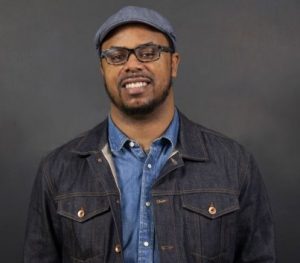 Brentin Mock approaches his stories through a social justice lens. A graduate of the University of Pittsburgh with joint BA degrees in English and African Studies, Mock recognized a void in environmental news coverage early in his career and set out to make a difference.
Brentin Mock approaches his stories through a social justice lens. A graduate of the University of Pittsburgh with joint BA degrees in English and African Studies, Mock recognized a void in environmental news coverage early in his career and set out to make a difference.
“I noticed there was not a great deal of environmental and climate journalism accessible to black communities,” said Mock, a reporter for The Atlantic’s CityLab.com. “My mission was to try to help impart to audiences just how serious environmental and climate change issues were, specifically for black communities.”
To accomplish his mission, Mock needed the requisite tools and understanding of science to dig through obscure scientific journals, which led him to Metcalf’s Environmental Reporting Fellowship in 2008. The Fellowship was designed to provide traditionally under-represented racial and ethnic minority journalists with an opportunity to learn basic science and gain environmental reporting skills.
“At the time, I wasn’t really sure how to source environmental and climate change reporting,” explained Mock. “Interacting directly with scientists, discovering new ways to access scientific briefs, and learning how to translate the science were some of the things I walked away with.”
Mock went on to write for The American Prospect, Colorlines.com, The Nation, and Grist.org, where he helped establish an environmental justice reporting fellowship for young journalists. As Mock evolved as a writer, he began to view environmental justice as a basic civil rights issue.
“Because it wasn’t just about desegregating the lunch counter, this was about real life and death issues impacting people’s quality of life,” explained Mock. “Whether they could breathe air, whether they have access to clean water, how land is used and exploited, all of these things are bread and butter issues that affect African-Americans’ livelihoods and health on a daily basis.”
Mock believes that scientists also have a responsibility to reach out to diverse audiences, and to view their research within a broader context that takes into consideration racial inequity and environmental injustice.
“Scientists have been cushioned in their professions not to have to deal with the broader social impacts of their science,” explained Mock, adding that he’s encouraged by what he sees as a shift in the scientific community. “They have started to realize that you can’t just look at science in a vacuum, they have to look at it within our society, which is colored by racism, sexism, and so forth.”
Mock points to the international climate agreement negotiated at the 2015 COP21 meeting in Paris as an example of scientists communicating more broadly about the societal impacts of their research, pushing the conversation towards the center, further away from the margins.
“There was more consideration of the impacts [of climate change] on vulnerable people of color than in previous talks,” said Mock, who filed a story for Colorlines about the agreement. “Scientists have opened themselves up to realize that climate change is a serious thing, that they have to talk about this in ways that everybody can understand, and that they can’t just speak to certain populations.”
Mock’s reporting has focused on everything from the criminal justice system, police brutality, voting rights, and affordable housing to urban development and environmental issues. As for his future stories, Mock would like to explore land use policy decisions and their impacts on communities, especially as they relate to climate change and other challenges.
“Justice is the lens, the approach, the framework for reporting on that,” said Mock.
Read stories by Brentin Mock
Why the U.N. Climate Change Agreement Wasn’t a Complete Disaster
The Oregon Standoff: Race, Land Use, and Environmental Protection
How the Collapse of Soul City Fired Up the Environmental Justice Movement
